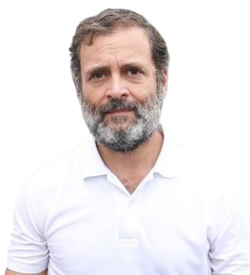Congress Raises Alarm After BJP Leader’s ‘Shoot Rahul Gandhi’ Threat.
In a fresh escalation of political tensions, the Congress party has raised serious concerns after a Bharatiya Janata Party (BJP) leader allegedly issued a shocking threat, declaring that “Rahul Gandhi will be shot in the chest.” The remark, described as inflammatory and dangerous, has set off a storm in the political landscape, with the opposition demanding immediate intervention from Union Home Minister Amit Shah.


By: Bharat Daily Samachar Date: 1 October,2025
In a fresh escalation of political tensions, the Congress party has raised serious concerns after a Bharatiya Janata Party (BJP) leader allegedly issued a shocking threat, declaring that “Rahul Gandhi will be shot in the chest.” The remark, described as inflammatory and dangerous, has set off a storm in the political landscape, with the opposition demanding immediate intervention from Union Home Minister Amit Shah.
A Letter to the Home Minister
Top Congress leaders wasted no time in addressing the matter formally. In a strongly worded letter to Amit Shah, the party expressed its “deep outrage” and demanded swift action against the BJP functionary who made the alleged threat. According to Congress, the threat not only endangers Rahul Gandhi’s personal safety but also reflects an alarming rise in political hate speech and intolerance.
The party emphasized that no democracy can thrive if opposition leaders face open calls for violence from ruling party members. “This is not just a threat to Rahul Gandhi—it is a threat to the very democratic fabric of our nation,” the letter read.
Political War of Words
Unsurprisingly, the remark has triggered a heated war of words between India’s two largest political parties. Congress spokespersons have condemned the threat as “irresponsible, criminal, and deeply disturbing,” while also accusing the BJP of fostering a culture of aggression in politics.
On the other hand, BJP leaders have largely distanced themselves from the controversy, with some dismissing it as an “individual opinion.” However, political observers note that silence or lukewarm responses from ruling party circles may fuel further criticism from opposition ranks.
Security Concerns for Rahul Gandhi
Rahul Gandhi, who has already been the target of security breaches in the past, continues to face heightened risks due to his high-profile political role. Congress leaders argue that the latest threat underlines the need for the government to take extra precautions to safeguard him.
The party has reminded authorities of the tragic assassination of former Prime Minister Rajiv Gandhi in 1991, cautioning that lessons from history should not be ignored. “We cannot afford to be complacent when it comes to protecting leaders who stand at the center of our national political discourse,” a senior Congress member said.
Public Reactions and Social Media Outrage
As news of the threat spread, social media platforms exploded with debates and anger. Hashtags condemning political violence trended across X (formerly Twitter), Facebook, and Instagram. While Congress supporters expressed solidarity with Rahul Gandhi, many neutral voices also criticized the growing toxicity of Indian political conversations.
Political analysts pointed out that India has long prided itself on the vibrancy of its democracy, where diverse ideologies coexist. However, incidents like these raise troubling questions about whether the culture of debate is being replaced by a culture of intimidation.
A Larger Pattern of Political Rhetoric?
This is not the first time political leaders in India have made remarks hinting at violence. In the past, both BJP and opposition leaders have come under fire for using provocative language during election rallies and press interactions.
But this particular threat stands out because it directly references an act of lethal violence. Critics argue that such rhetoric normalizes the idea of physical harm in political competition—something that could have devastating consequences for the nation’s democratic traditions.
The Congress Stand
The Congress party, already in campaign mode ahead of upcoming state elections, is now likely to turn this controversy into a rallying cry. By spotlighting the threat against Rahul Gandhi, the party seeks to portray itself as the victim of political vendettas while raising larger questions about law and order under the BJP government.
Party strategists believe the incident could strengthen Rahul Gandhi’s image as a leader willing to stand firm despite hostility. “Rahul Gandhi has faced abuses, attacks, and now even death threats. Yet, he continues to fight for truth and justice. That resilience itself is his strength,” a Congress leader remarked.
Amit Shah’s Response Awaited
The ball is now in the Home Minister’s court. Political circles are closely watching to see how Amit Shah responds—whether through a strong statement, legal action, or enhanced security measures. His response will be critical, not just for the immediate controversy, but also for how the government is perceived in terms of upholding democratic values and protecting opposition leaders.
Why This Matters for India’s Democracy
At its core, the issue is not just about one leader or one party. It is about setting boundaries in political discourse. Death threats, whether real or rhetorical, represent a dangerous departure from the principles of debate, dialogue, and democratic competition.
If such statements are left unchecked, it risks sending a chilling message: that politics in India can cross over into violence and intimidation. And that is a scenario no democracy can afford.
Conclusion
As the storm rages, one thing is clear: this controversy has struck a chord far beyond party lines. It has ignited discussions about civility in politics, the responsibility of leaders to safeguard democratic norms, and the importance of ensuring security for public representatives.
Whether this moment becomes just another political flashpoint or sparks a serious conversation about accountability in public life will depend on how swiftly and firmly action is taken.
For now, all eyes remain on Amit Shah—and the message his response will send to both India and the world.
